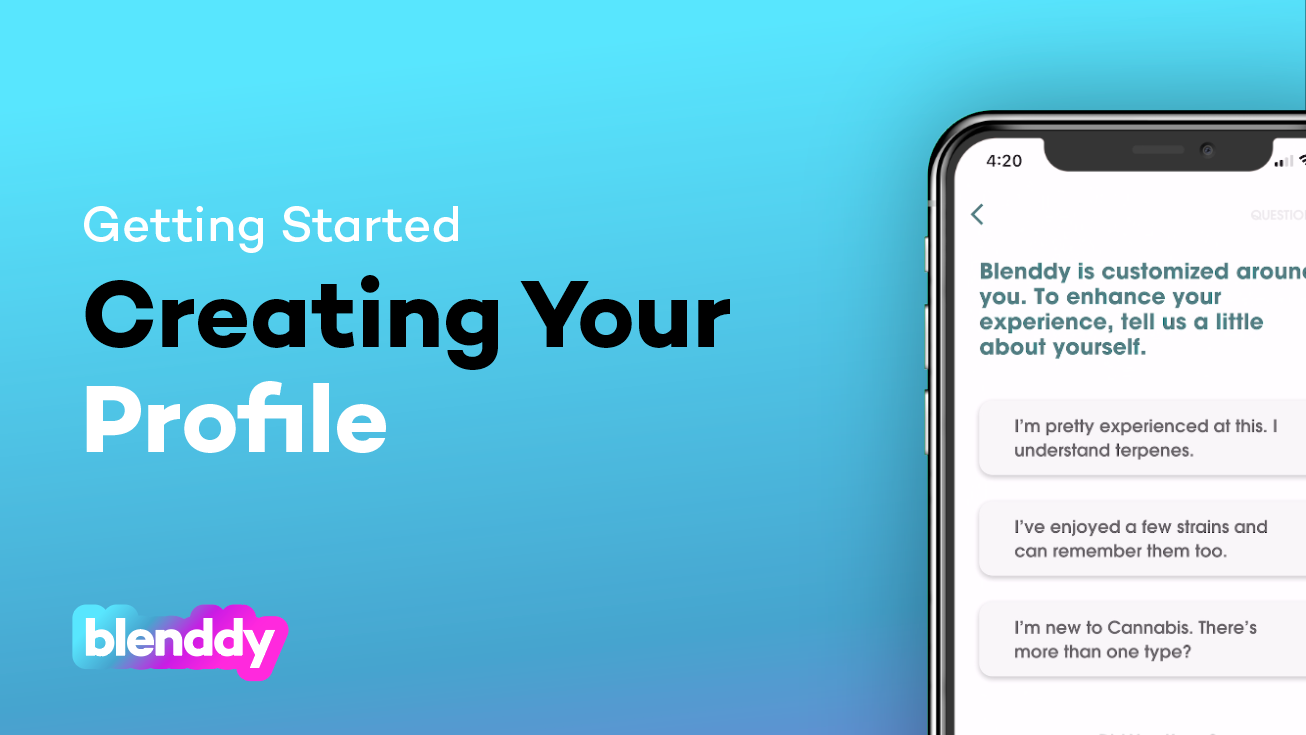Cannabis is a fascinating plant with many uses. This quick guide covers some key cannabis terms as they relate to Blenddy, to help you better understand the different options and find your perfect blend. Whether you’re new to cannabis or an experienced consumer, knowledge is power when it comes to reaching your desired experience. We hope you find this cannabis glossary helpful on your blending journey.
Appellation – A fancy word that refers to where a cannabis strain was originally grown and how it was produced. For example, Humboldt County in California is famous for outdoor-grown cannabis. An “appellation” ties the unique characteristics of a cannabis product to its geographical region, kind of like how wine and cheese have appellations connected to different places. When you know the appellation, it helps give you an idea of the environment the cannabis was grown in before you even try it out!
Broad Leaf Varietals (BLV) – A way to categorize different cannabis plants by how their leaves look. Broad leaf plants have, you guessed it, broad leaves! These wide-leafed plants are associated with indica strains. The other main category is Narrow Leaf Varietals (NLV) – those have skinnier, pointier leaves and are usually sativas. So if you’re checking out a new strain and see it has big wide fan leaves, chances are it leans more indica. Knowing the leaf style gives you clues about how the plant might grow and the effects you can expect.
Budtender – The awesome person who helps you choose your cannabis products at the dispensary counter. They’re like bartenders, except for cannabis! A knowledgeable budtender is there to answer all your questions, make recommendations about strains and products that fit what you’re looking for, and explain anything you’re unsure about.
Cannabinoids – The chemical compounds made naturally by the cannabis plant that interact with receptors in the human body’s endocannabinoid system. Cannabinoids are what give the different strains many of their therapeutic effects and recreational highs. Getting to know the most common ones helps you understand what effects you can expect.
Cannabis – The official name for the plant that we also call weed or marijuana. People have used cannabis for a long time recreationally to feel good and spiritually connected, or medicinally to help with health conditions.
Cannasseur – A cannabis expert who really knows their stuff, like a wine or food connoisseur. Cannasseurs nerd out over all the amazing strains out there and how their effects differ. They love tasting and reviewing new buds to pick out subtle flavors and feel those unique highs. A great friend to have when you’re new to the world of cannabis!
CBD – Short for cannabidiol (can-na-bi-DI-ol). CBD is one of the main compounds in cannabis that makes you relaxed and sleepy. It’s also used to help relieve pain. When you use full spectrum cannabis with THC and terpenes, the CBD works together with those other elements. Useful science fact: It’s vaporization temperature is 180˚C/356˚F.
CBN – Short for cannabinol (can-na-BIN-ol). CBN is a compound that forms as THC degrades and can be found within older, aged cannabis. It can make you feel extra sleepy and relaxed. People also use it for pain relief and to bring down inflammation. Fun science fact: CBN starts boiling at 185˚C/365˚F, so don’t set your vape hotter than that if you don’t want to fall asleep!
Chemovar – Also referred to as Chemotype, this confusing word just means the chemical makeup of a specific cannabis variant or “cultivar.” All the different compounds like cannabinoids, terpenoids, and flavonoids make up the chemovar. It’s like the ingredient list that gives each strain its special characteristics!
Combustion – The scientific word for burning. Combustion happens when you light up your bud with a flame, like when smoking a joint or lighting a bowl. Burning converts the chemicals in cannabis so you can absorb them by inhaling the smoke. Vaping and eating edibles avoid combustion completely. see more
CTFs – Short for Cannabinoids, Terpenoids, and Flavonoids – the main chemical compounds found in cannabis. Getting to know these important ingredients will help you understand what makes each strain unique and how they work with your body’s endocannabinoid system!
Cultivar – Short for cultivated variety, cultivar is a fancy science word people use instead of “strain” to describe cannabis. Cultivar indicates a cannabis plant variety that’s been cultivated or bred for certain traits.
Dabbing – A way to smoke ultra-concentrated cannabis extracts using a “dab rig”. You heat up a metal, glass, or ceramic surface called a nail, then touch the sticky extract (or shatter, wax etc) directly to the hot surface while inhaling through the rig – that’s your “dab”. Like vaping, lower and higher heat releases different flavors and effects based on the extract’s terpenes and cannabinoids.
Edibles – Cannabis-infused foods and drinks, like gummies, baked goods, oils, butter, and more. When you eat or drink cannabis instead of smoking it, the high feels different and kicks in more slowly. Edibles come pre-made or can be homemade using THC oils and butter. Just go slow – the effects can be extra strong! see more
Endocannabinoid – A type of chemical your body makes naturally that plays a big role in keeping you healthy. The ones your body produces are called “endocannabinoids”. Cannabis plants have similar external chemicals called “phytocannabinoids” that also interact with your endocannabinoid system.
Endocannabinoid System (ECS) – The complex biological system of receptors (CB1 and CB2), enzymes, and chemicals like endocannabinoids that are spread throughout your brain and body. It works behind the scenes to keep your various functions balanced and running smoothly! External cannabinoids from cannabis such as topicals can also influence the ECS.
Entheogenic – Psychoactive plants and fungi that can alter your perception, mood, consciousness, thinking, or behavior when ingested. Cultures around the world have traditionally used entheogenic natural substances like cannabis in spiritual practices to induce mystical and religious experiences. So you could say cannabis has some “magic” that unlocks different states of mind!
Entourage – The idea put forth by Raphael Mechoulam that all the different cannabis compounds like cannabinoids and terpenes work together rather than alone. It’s the synergy and interactions between all the components that make each strain uniquely therapeutic and recreational.
Flavinoid – Compounds that give cannabis its yummy aromas and flavors. They also may combine with terpenes and cannabinoids to produce therapeutic effects. You’ll find flavinoids naturally in lots of fruits and vegetables too.
Flowers – Dried buds from the cannabis plant that you can smoke or vape. Flowers give you the full package of cannabinoids, terpenes, and flavinoids working together. More old school than concentrates, but lots of people still love their flower power. see more
Genotype – A plant’s unique DNA profile and genetic traits. While seeds may come from the same genotype or ancestors, differences in growing conditions cause variations in how they develop – like sibling plants expressing themselves differently. These are called phenotypes.
Hashish – Concentrated cannabis resin pressed into a solid form, like a paste or powder. Special solvent-free extraction techniques are used to make awesome hash products like bubble hash, dry sift, ice wax etc. Connoisseurs love hash for its high THC and terpene content!
Hybrid – A cannabis plant combining both sativa and indica genetics. Hybrid buds have a blend of effects and growing traits from both sides of the family tree. Hybrids can lean towards sativa or indica making you feel active or sleepy.
Indica – A type of cannabis often short and bushy with wide, broad leaves. Indica strains are known for providing relaxing, sedative effects that help ease pain, anxiety, and sleep issues. Start slow with these nighttime buds!
Landrace – Old school “original gangster” cannabis plants native to specific regions such as India, Africa, and Central America. Landraces represent pure, untouched genetics passed down over generations. Most modern strains originate from these ancestral cannabis building blocks!
Marijuana – A name for cannabis that became popular in the early 1900s. Sometimes associated with negative stigma, but use of this term is shifting as laws and attitudes change. We prefer the natural elegance of “cannabis” over everything! cultural stigma
Narrow Leaf Varietals (NLV) – Skinny, pointy leaves are telltale signs of narrow leaf cannabis plants, typically sativas. Compare to their Broad Leaf Varietals (BLV) cousins and hybrid mixes. Leaf shape can offers clues to the high and growing behavior you can anticipate.
Oils – Ultra-concentrated cannabis extracts with high levels of THC, CBD, terpenes and other goodies. Solvent extraction techniques are used to make delicious cannabis oils like shatter, diamonds, butter, crumble, sugar, fine powders, and more – smokeable or infusable.
Phenotype – The physical features and traits exhibited by a plant based on its genetics (genotype) AND specific environmental conditions during growth. It’s nature AND nurture that make a plant unique.
Pipe – A handy little device with a bowl for loading ground up cannabis flower to smoke through combustion. Pipes come in all shapes, sizes, and materials like glass, metal, wood, ceramic etc. Try them all to see the differences.
Resin – A sticky, gooey secretion oozing with compounds like THC, CBD, and terpenes. Solventless heat and pressure techniques produce varieties like hashish or rosin. Resin also refers to the claimable leftovers in pipes and dab rigs after smoking. Don’t scrape that nasty pipe weed tar though if you value flavor. Let’s just stick to the good stuff.
Rosin – A tasty, solventless cannabis extract made by squeezing resin glands with gentle heat and pressure to get ooey gooey rosin goodness. Rosin keeps all those delicious terpenes and cannabinoids intact for smooth, flavorful dabs.
Ruderalis – This short, bushy cannabis variety looks different than tall sativas and wide indicas. Native to Russia and Eastern Europe, ruderalis has low THC like hemp. But it has a cool autoflowering trait that initiates flowering based on age automatically! Breeders carefully cultivate ruderalis hybrids over generations to merge this auto-flowering gene to create easy-to-grow strains.
Sativa – Typically tall, christmas tree-shaped cannabis plants with long, narrow finger-like leaves. Sativa buds provide energizing, cerebral effects prized by creative types and daytime users.
Strain – Common terminology for all the unique varieties of cultivated cannabis aka cultivars. Different strains have their own looks, effects and aromas – just like how grapes, apples, and other fruits come in many different cultivated types.
Tar – Icky black sticky residue full of contaminants left behind after smoking cannabis. You’ll often find it caked on old pipes and bong parts if they aren’t cleaned regularly. Best not to collect or consume that nasty stuff.
Terpenoids – The flavorful, aromatic compounds in cannabis responsible for each strain’s unique flavor and fragrance signature. Terpenes also interact with cannabinoids to create the entourage effect, making them the most important way to differentiate among strain details.
Terrior – The complete regional growing environment that affects a cultivar’s terpene and cannabinoid profile. Factors like the soil, geology, climate, altitude, and more shape a strain’s unique flavors, aromas, and effects. Let your nose guide you on a cannabis terroir adventure to appreciate the impacts of nature and nurture!
THC – aka tetrahydrocannabinol. THC is the best known marijuana compound – it’s mainly responsible for those classic psychoactive effects. THC works together with terpenes to shape your experience. Start low and slow to find your sweet spot! Fun fact, THC’s vaporizes at 157˚C/315˚F.
Titration – It is the foundation of Blenddy’s Session Log feature. Carefully adjusting your cannabis dosage over time to pinpoint just the right amount for you. Like gradually adding spice to a dish until it’s perfectly spicy but not overwhelming. It’s a marathon, not a race – be patient finding your groove!
Trichomes – The mushroom-shaped sticky resin glands blanketing cannabis flowers seen under a microscope. Trichomes hold the highest concentrations of cannabinoids and terpenoids. More trichomes = more white frost on buds = more effects.
Vape – A handy device that gently heats cannabis to produce smooth inhalable vapor, not smoke. Vaping flower, oil carts, or concentrates allows you to experience flavors and effects while avoiding the carcinogens created by combustion and smoke. Start low, go slow with temperatures as you vape away!
Weed – A slang nickname for cannabis that became popular in the mid 1900s. While weed may not sound very sophisticated, cannabis doesn’t really mind as long as you show some respect! No judgment about this beloved plant.


